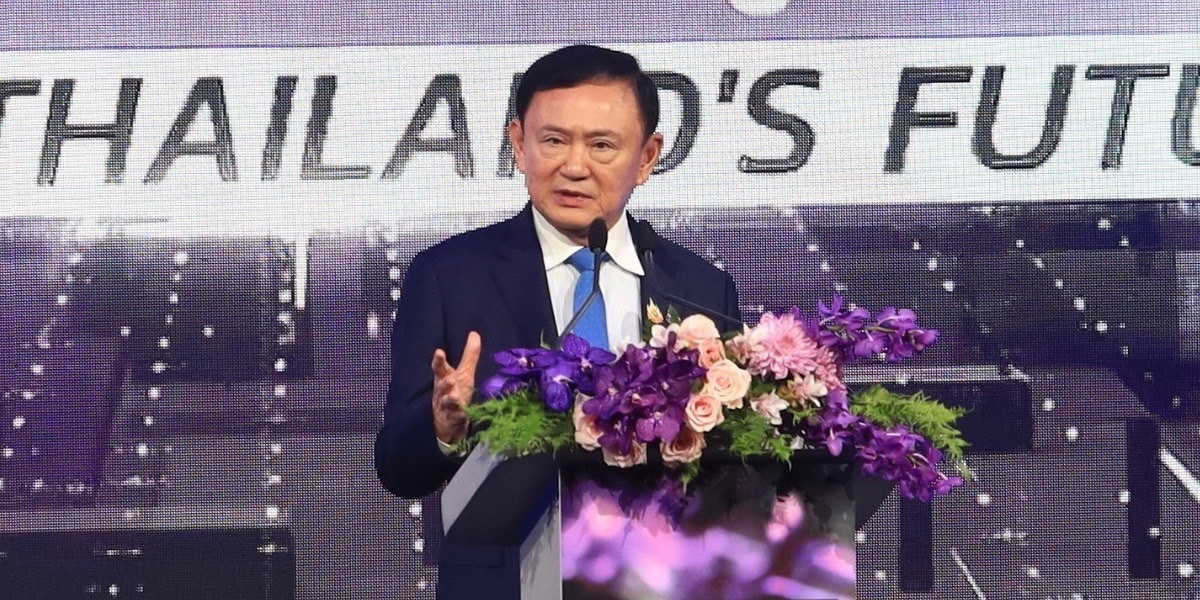Former Prime Minister Thaksin Shinawatra recently outlined a strategic vision for Thailand’s future, focusing on transforming the nation into a regional aviation hub and accelerating a digital transformation driven by electric vehicle (EV) production and green energy for data centers.
Becoming an Aviation Hub
Thailand possesses a geographical advantage to emerge as an ASEAN aviation center, yet its airport development has been hindered. A significant issue identified is the low Passenger Service Charge (PSC), currently 735 baht per person, which is considerably lower than Singapore’s 1,500 baht. Thaksin proposed that increasing the PSC by just 100 baht could boost Airports of Thailand Public Company Limited (SET: AOT)’s annual profit by 14,000 million baht, while a 300 baht increase could generate over 40,000 million baht. This substantial revenue could be invested in airport expansion, enhancing readiness, and developing a full-scale aviation hub encompassing passengers, cargo, and aircraft repair centers.
He noted that Thailand’s current low transit passenger rate is due to inadequate services and connecting flights. Additionally, “petty laws,” such as the ban on indoor smoking rooms, also act as obstacles—particularly for transit passengers. Funds from an increased PSC could also facilitate the expansion of provincial airports like Phuket and Chiang Mai, or even the acquisition of Krabi Airport, strengthening AOT’s role as a major national income generator.
Digital Transformation: EVs and Green Energy for Data centers
Beyond aviation, Thaksin advocated for Thailand to become a global hub for electric vehicle (EV) manufacturing and green energy. To fortify Thailand’s automotive industry, he suggested implementing an excise tax on imported vehicles lacking local content, with the tax rate proportional to the local content of parts manufactured in Thailand. He believes Thailand can develop its own EV industry and attract foreign joint ventures, citing the example of a new Thai-designed electric tuk-tuk, which could be locally produced at a cost of approximately 200,000 baht per unit—offering reduced pollution, enhanced safety, and cost savings. This initiative aims to maintain Thailand’s position as a car production hub alongside China.
A critical component of this digital transformation is the shift towards green energy. Thailand currently imports vast quantities of fossil fuels, equivalent to an electricity demand of approximately 40,000 megawatts (MW) daily. Thaksin proposed constructing large-scale solar farms across an estimated 1.4 million rai of available land, capable of generating 40,000 MW of 24/7 green electricity. This would not only eliminate the need for fuel imports but also establish Thailand as a significant exporter of green electricity.
Crucially, this abundant green energy supply is vital for attracting global data centers, which increasingly demand clean power. Data center operations are compared to a booming real estate sector, requiring green electricity, water, and proximity to major cities to attract engineers. While Thailand offers water and relatively inexpensive land in some areas, it currently lacks sufficient green electricity. Thaksin’s vision includes building solar farms in the Northeast with dedicated high-voltage direct current (HVDC) transmission lines directly to data centers, potentially reducing electricity costs to as low as 3 baht per unit. Realizing this, and establishing a “Green EGAT” (Electricity Generating Authority of Thailand), would enable Thailand to compete globally and become the “Embassy of the World” for data centers.





